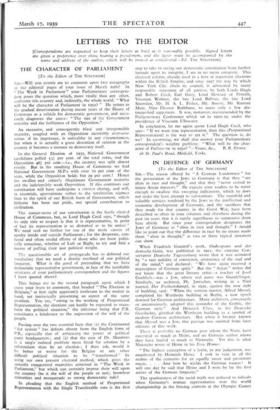LETTERS TO THE EDITOR
[Correspondents are requested to keep their letters as brief as is reasonably possible. Signed letters are given a preference over those bearing a pseudonym, and the latter must be accompanied by the name and address of the author, which will be treated as confidential.—Ed. THE SPECTATOR]
THE CHARACTER OF PARLIAMENT
[To the Editor of THE SPECTATOR] SIR,—Will you permit me to comment upon two paragraphs in the editorial pages of your issue of March loth? In " The Week in Parliament " your Parliamentary correspon- dent poses the question which, more vitally than any other, confronts this country and, indirectly, the whole world. " What will be the character of Parliament in 195o? " He points to the gradual deterioration during recent years of the House of Commons as a vehicle for democratic government, and accu- rately diagnoses the cause: " The size of the Government majority and the feebleness of the Opposition."
An excessive, and consequently blasé and irresponsible majority, coupled with an Opposition inevitably over-con- scious of its impotence, is unhealthy in any circumstances, but when it is actually a gross distortion of opinion in the country it becomes a menace to democracy itself.
In the General Election of 1935, National Government candidates polled 534 per cent. of the total votes, and the Opposition 464 per cent —i.e., the country was split almost evenly. But in the resulting House of Commons we find National Government M.P.s with over 70 per cent. of the seats, while the Opposition holds but 29 per cent.! Hence the swollen and entirely illegitimate Government majority and the indefensibly weak Opposition. If this continues our constitution will have undergone a sinister change, and will, in essentials, approximate rather to the totalitarian regimes than to the spirit of our British form of Government, which hitherto has been our pride, our special contribution to civilisation.
The corner-stone of our constitution is the freely elected House of Commons, but, as Lord Hugh Cecil says, " though its only title to respect is that it is representative, in point of fact its representation is so distorted as to be unreal." We need seek no farther for one of the main causes of apathy inside and outside Parliament ; for the desperate, con- fused and often sordid efforts of those who are most politi- cally conscious, whether of Left or Right, to try and find a means of pulling their just political weight.
The questionable art of propaganda has so debased our vocabulary that we need a drastic overhaul of our political language. What is the good of pretending that we have democratic representative government, in face of the justifiable strictures of your parliamentary correspondent and the figures I have quoted above?
This brings me to the second paragraph upon which I crave your leave to comment, that headed " The Election in Belgium," at first sight apparently irrelevant to the matter in hand, yet intrinsically presenting• an aspect of the same problem. You say, " owing to the working of Proportional Representation, the elections can hardly be expected to trans- form the political situation," the inference being that P.R. constitutes a hindrance to the expression of the will of the people.
Passing over the two essential facts that (I) the Continental " list system " has defects absent from the English form of P.R., especially that of enhancing the power of political party headquarters ; and (2) that the case of Dr. Maartens is a single isolated problem more fitted for solution by a referendum than by an election ; I then ask, would •it be better or worse for the Belgian or any other difficult political situation to be " transformed " by using our own present electoral method, which gives the unjustly exaggerated majorities criticised in " The Week in Parliament," but which can certainly impose their will upon the country (be it the will of the people or not), browbeat minorities and masquerade as strong democratic rule?
In pleading that the English method of Proportional Representation with the Single Transferable vote is the first step to take in saving our democratic constitution from further inroads upon its integrity, I am in no mean company. This electoral reform, already used in a host of important elections within the British Empire, and since 1937 the way by which New York City elects its council, is advocated by many responsible statesmen of all parties; by both Lords Hugh and Robert Cecil, Earl Grey, Lord Howard of Penrith, Viscount Wolmer, the late Lord Balfour, the late Lord Snowden, Mr. H. A. L. Fisher, Mr. Amery, Mr. Ramsay Muir, Miss Eleanor Rathbone, to name only a few dis- tinguished supporters. It was, moreover, recommended by the Parliamentary Conference which sat in 1929-30, under the presidency of Viscount Ullswater.
In conclusion, let me again quote Lord Hugh Cecil, who says: " If we want true representation, then this (Proportional Representation) is the way to get it." The question is, do we? In answering, we shall also answer your Parliamentary correspondent's weighty problem : " What will be the char-
acter of Parliam mt in 195o? "—Yours, &c., B. R. EVANS. 26 St. Paul's Road, Mirfield, Yorks.










































 Previous page
Previous page